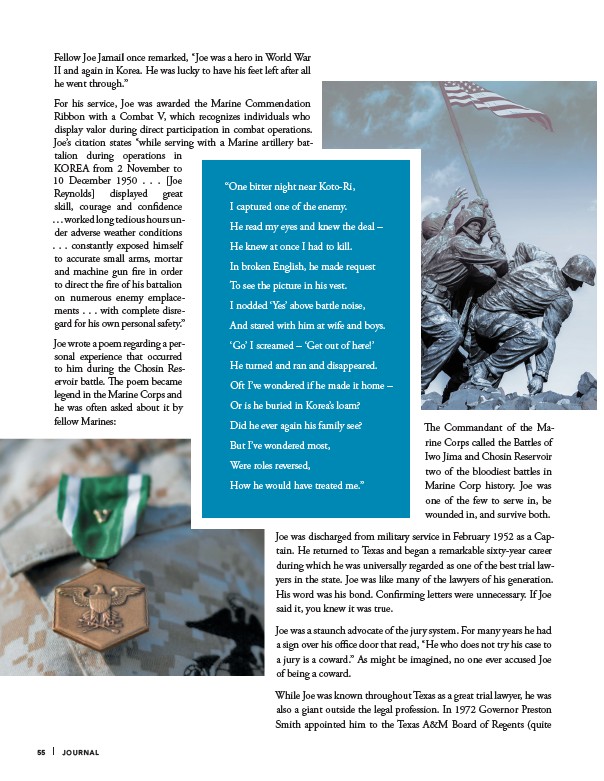
Fellow Joe Jamail once remarked, “Joe was a hero in World War
II and again in Korea. He was lucky to have his feet left after all
he went through.”
For his service, Joe was awarded the Marine Commendation
Ribbon with a Combat V, which recognizes individuals who
display valor during direct participation in combat operations.
Joe’s citation states “while serving with a Marine artillery battalion
during operations in
KOREA from 2 November to
10 December 1950 . . . Joe
Reynolds displayed great
skill, courage and confidence
. . . worked long tedious hours under
adverse weather conditions
. . . constantly exposed himself
to accurate small arms, mortar
and machine gun fire in order
to direct the fire of his battalion
on numerous enemy emplacements
. . . with complete disregard
for his own personal safety.”
Joe wrote a poem regarding a personal
experience that occurred
to him during the Chosin Reservoir
battle. The poem became
“One bitter night near Koto-Ri,
I captured one of the enemy.
He read my eyes and knew the deal –
He knew at once I had to kill.
In broken English, he made request
To see the picture in his vest.
I nodded ‘Yes’ above battle noise,
And stared with him at wife and boys.
‘Go’ I screamed – ‘Get out of here!’
He turned and ran and disappeared.
Oft I’ve wondered if he made it home –
Or is he buried in Korea’s loam?
Did he ever again his family see?
But I’ve wondered most,
Were roles reversed,
How he would have treated me.”
legend in the Marine Corps and
he was often asked about it by
fellow Marines: The Commandant of the Marine
Corps called the Battles of
Iwo Jima and Chosin Reservoir
two of the bloodiest battles in
Marine Corp history. Joe was
one of the few to serve in, be
wounded in, and survive both.
Joe was discharged from military service in February 1952 as a Captain.
He returned to Texas and began a remarkable sixty-year career
during which he was universally regarded as one of the best trial lawyers
in the state. Joe was like many of the lawyers of his generation.
His word was his bond. Confirming letters were unnecessary. If Joe
said it, you knew it was true.
Joe was a staunch advocate of the jury system. For many years he had
a sign over his office door that read, “He who does not try his case to
a jury is a coward.” As might be imagined, no one ever accused Joe
of being a coward.
While Joe was known throughout Texas as a great trial lawyer, he was
also a giant outside the legal profession. In 1972 Governor Preston
Smith appointed him to the Texas A&M Board of Regents (quite
55 JOURNAL